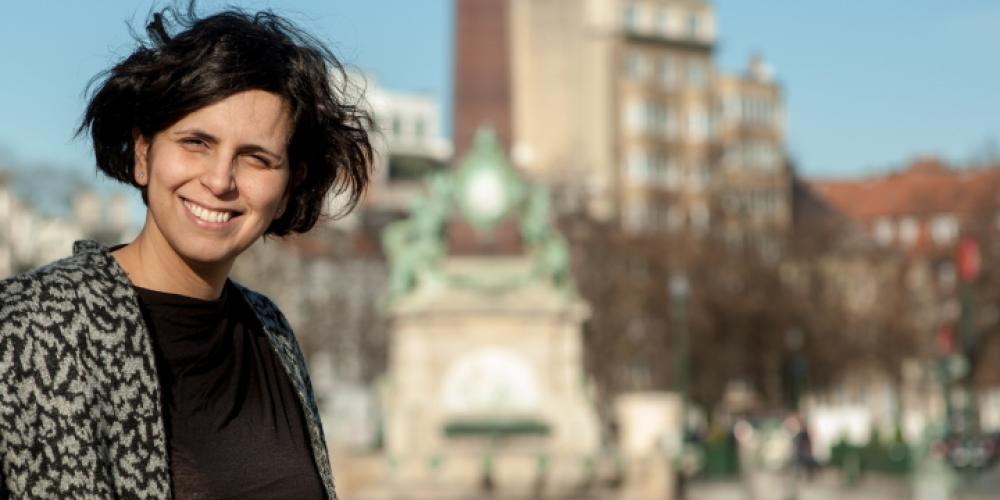
The pictures of the inaugural lecture of the Fatima Mernissi Chair can be viewed here.
The idea for the Fatima Mernissi Chair originated with Flemish congresswoman Yamila Idrissi and Saïda Sakali, project coordinator at the King Baudoin Foundation. They thought it was remarkable that there was no specific teachings on islam at VUB, nor that there was any research into the religion. And that while the university is located in Brussels: a city where a large number of inhabitants are muslim. When Mernissi died on December 30th 2015, they saw the time ripe to point out this omission. The result being the establishment of a chair in honour of the moroccan sociologist.
How did they end up with you for the Fatima Medrissi Chair?
Iman Lechkar: “That came to be through Sarah Bracke, a research at RHEA, the expertise center for Gender, Diversity and Intersectionality at VUB. She knew me from my time at KU Leuven, where I obtained my PhD in social and cultural anthropology. She knew I specialise in the position of islam in the secular, western but also Belgian context and was familiar with my work concerning reformation to islam and the complicated islamic identification after the events of 2001 and the ensuing ‘war on terror’. That made me the ideal chair holder in her eyes.
The chair does what rector Caroline Pauwels aims to do with VUB: tear down walls
Which similarities do you see between your specialisation and the chair?
Iman Lechkar: “Oh, they are plentiful. For a while I was actively involved in and around the artistic and cultural sectors. I wanted to know how those worlds dealt with the diversity of cultures and religions and how amid that extreme diversity we succeed in getting everyone onboard with the same common story. But what also interests me very much, is what VUB can bring to that context, that story. That concords very well with the ambition of rector Caroline Pauwels to have VUB tear down walls. The Fatima Mernissi Chair is the concretisation of how the university will do that, by making the connection to the wider society - and in Brussels, where a large proportion of the population is muslim, it also means reflecting on how to deal with the so-called muslim question. But even aside from that Brussels is a super diverse ecosystem. Minorities form a majority there. I see the chair as an answer to the question as to how in such a context you can create a beautiful cross-pollination towards an inclusive society. That was moreover what Fatima Mernissi aspired to: making a connection between the east and the west, between men and women.”
A university also has a social mandate
So that is the goal of this chair: making connections?
Iman Lechkar: “Absolutely! On two levels even. The first is academic, that is my job. But there is also a social objective, whereby we want to create an alliance with organisations such as Citizenne, the KVS theatre, Femma, D’Broej, Moussem and others. Those are organisations that are committed to women’s issues, minorities, art and youth. Because don’t forget: aside from a role in education and research, a university also has a social mandate.”
Even so, those organisations and sectors have been around for ages. What can a university add to that equation?
Iman Lechkar: “The transversal, bridging function. What the social sector does is also very interesting, but who are the different actors? We actually want to do what Mernissi also did: by not choosing one actor, but rather build bridges between the different actors. By bringing the university to that social sector you can analyse certain things, acquire new insights, perform academic innovative work. That is also interesting for the social sector, because it increases the visibility of their work and intensifies their network. At the launch of the chair we will hold a networking event where all our partners will be present. That sounds obvious, but it still is a way of bringing everybody together and acquainted with one another. And that is no luxury, because even though the organisation know what the others do, they haven’t truly cooperated yet. It will be VUB, through this chair, that creates this synergy and plays the role of catalyst.”
A final question: what will you talk about during your inaugural address?
Iman Lechkar: “Good question! My lecture will be about Brussels. Better yet: the violence that confronted its inhabitants and really all Belgians on March 22nd, 2016, the day of the attacks. I want to explore those horrific events and connect them to other kinds of violence that however are not labeled in such a way. I’m talking about the material violence that hides behind such phenomenons as unemployment and socio-economic subjection mechanisms. Without wanting to make a causal connection, I am convinced that this material violence influences that other violence, which is terroristic, physical and criminal by nature. Another type of violence that I want to shed light on, is the symbolic violence connected to the debates that are carried out in the name of neutrality around wearing a hijab of ritual slaughter for Eid al-Adha. The question I have on that topic, is what neutrality entails in a society that has not known a homogeneous composition for a long time. There you have the major outline of what I want to talk about.”
The opening celebration of the Fatima Mernissi chair will be held on Thursday 26th of January at Kaaistudios, Onze-Lieve-Vrouw van Vaakstraat 81, 1000 Brussels.
The inaugural address by Iman Lechkar is titled ‘The Brussels Mix: Violence, Islam and Gender’.
ATTENTION: REGISTRATION FOR THE OPENING CELEBRATION IS NO LONGER POSSIBLE.